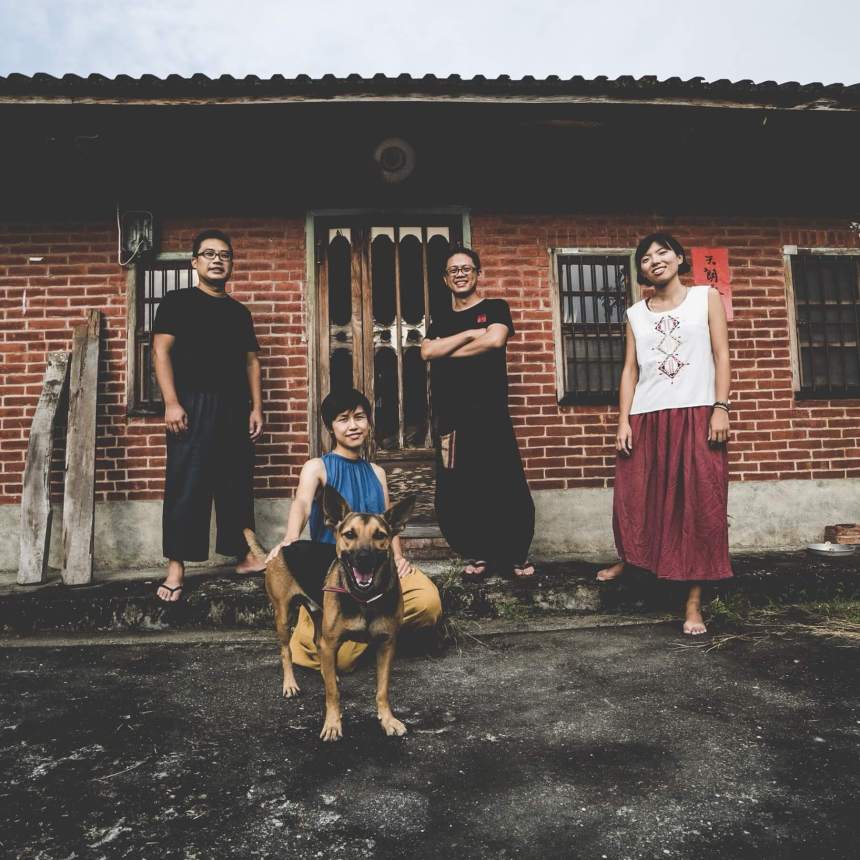2019 World Music Festival comes to Taipei from October 18-20, showcasing acts from around the world, as well as some of the island’s best indigenous musical talent. Taiwanese act TUDI-VOICE, formed in 2007, is a Golden Melody Award-winning group whose music touches on social and environmental issues across Taiwan. Taiwan Scene chatted to them about their hometown, their process and what we can expect from them at 2019 World Music Festival. Read on for the full interview and see a clip of the band’s music below. (Read also: Language of love: indigenous R&B singer ABAO on Paiwanese music)
Q1. Why did you become musicians?
In the beginning, we just wanted to express how we felt about the social issues that were happening around us through music. With the encouragement of friends, our first album 幹!政府!(Fu*k the Government) was released in 2009, and then the second one 還我土地 (Return Our Land ) was released in 2011. The records sold so much better than expected, we thought we were going to make a loss but we didn’t. We even made a profit. Meanwhile, we gradually accumulated fans in all parts of Taiwan, and then in 2013, we released our third album 幸福在哪裡 (Where is the Happiness ). We were lucky enough to be nominated for the Golden Indie Music Awards, and the song 失去記憶的城市 (‘THE CITY WITH NO MEMORIES ’) won the award for best folk song that year. We slowly embarked on the road of being professional musicians.
Q2. When did you choose the name “TUDI-VOICE”? What was your vision?
We want the sound from the land of Taiwan to be heard by the world, that’s why we’re called TUDI-VOICE. TUDI comes from the sound of land in Mandarin. (土地) And when it comes to the Band’s name in Chinese 農村武裝青年 (nóng cūn wǔ zhuāng qīng nián ), we wanted to pay tribute to the rice bomber, Yang Rumen. Just like Yang, Our vocalist, Ada, also grew up in the rural areas of Changhua. We deeply understand the inequality of the great gap between urban and rural areas. We want to use music as a bomb to make the island’s unfairly treated voices heard.

Q3. Could you introduce your band members?
The band consists of four members:
Ada (阿達) – vocalist, guitar, and yueqin (月琴, a four-stringed instrument similar to a lute)
Lya (俐君) – cello and piano
Alu (阿盧) – liuqin ( 柳琴, a four-stringed Chinese mandolin), ruan (阮咸, a traditional Chinese plucked string instrument), kezaixian(殼仔弦, a two-stringed fiddle), and chorus
Yuwei(育瑋) – djembe and chorus

Q4. Among all of your works, which song is your favorite one? For first time foreign listeners to your music, which song would you suggest they listen to?
We like the album 根 (Kin) the most. And we would recommend the song 揣啊揣 (‘Tshuē–ah tshuē’) from that album for new listeners. ‘Tshuē–ah tshuē’ raises awareness of Taiwanese agriculture.
Q5. From your perspective, what’s the relation between music creation and social movement? How can music impact our society?
Music cannot specifically and directly affect the social movement. It can only play the role of a lubricant. Issues can be inspired by the power of music, and people’s actions regarding the issues can be enthused.
Q6. What drives you to compose songs?
We are eager to express ourselves! We want to search for our roots, our identity, and to pursue the truth, freedom, and democracy.
Q7. How would you describe your hometown, Changhua? What are the cultural elements that represent Changhua?
Words we’d use to describe Changhua are: quiet, earthy, straight, grassroots. In terms of culture, unhurriedly humanity, simple and elegant temples and incense fragrance, and simmered pork rice, hot stew. (Read also: Taiwan Culture and Cuisine Shine on New Netflix Series “Street Food”)

Q8. How would you describe Taiwan? How would you define Taiwanese culture?
Public security is very good, people are very polite and full of human touch, which is something you need to come and experience. The small island has diverse ethnic cultures, including Han, Hakka, Austronesian Indigenous groups etc., and is rich in natural ecology.


Q9. For a foreigner, what would you suggest they do to best understand Taiwanese culture?
Walk around a traditional local market in Taiwan where you can eat, drink and chat for a whole day. Furthermore, we recommend you to catch a random country bus and get off only when you feel like it. Taiwan is a really safe country ,people are hospitableand everyone will always welcome you.

Q10. Where would you recommend for a tourist to go who wants to learn more about Taiwanese culture?
Traditional morning or evening markets, temples, agricultural/fishing villages, indigenous tribes, high mountains and Legislative Yuan.
Q11. Can you teach our readers a Taiwanese sentence that you think everyone should learn?
食飽未( Chia̍h-pá-bōe), which means “ have you eaten yet?” It is a very common way for people to greet each other and it’s very useful when you are visiting the countryside in Taiwan.
Q12. Can you share with us which songs you will perform at this year’s World Music Festival?
揣啊揣 (Tshuē–ah tshuē, ‘The Search’), 望水 (Bāng Tsu í, ‘The Hope of Water’), 四門譜 (sì miàn pǔ; it’s a very common tune in traditional music and opera), 遊花園 ( yóu huā yuán; inspired by the Taiwanese folk songs performed at funerals), 這咧老歲仔 (ji le lao huei ah, ‘This Old Man’), 海岸悲歌(Song of the Crying Sea), 濁水溪溪水流(zhuó shuǐ xī xī shuǐ liú, ‘Flowing Waters of the Zhoushui River ’; a song to show the appreciation of the motherland and the hard work of the ancestors).

For full lineup details, tickets, and more information on the festival, visit the official 2019 World Music Festival website.











